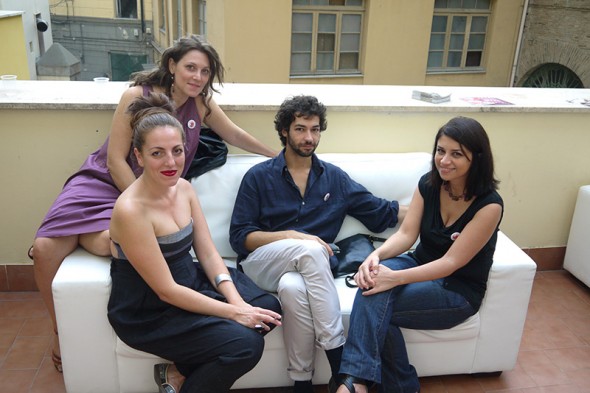We recently caught up with former student Flavia Scognamillo, a graduate of our 2011-12 class, who is designing schools and residences for disadvantaged communities in Tamil Nadu, India through an NGO from her native Italy.
A few members of the Made in Earth team during a fundraising event. From left to right: Giuliana Sandulli, Ada Catapano, Alessandro Turchi and Flavia Scognamillo)
Name: Flavia Scognamillo
Age: 30
Nationality: Italian
Occupation: Architect
Location: Made in Earth, Naples, Italy
Area of interest/specialty: Community-based projects
Professional goal: To improve quality of life promoting social inclusion and capacity building
What did you do after graduating from the program?
I obtained my professional license in Italy and participated in design competitions and training courses. In 2013, I took part in the Leonardo da Vinci EU mobility program, during which I worked in Granada, Spain. My hosting organization was a center for immigrants, children and people in need, where I coordinated several educational and vocational activities in order to implement a community participation strategy. Since last year, I have worked as assistant urban planner and currently I am currently architect at Made in Earth ONLUS, a Naples-based non-profit association.
Vellore House is the second children’s home project of Made in Earth. It hosts twenty abandoned/parentless HIV-positive children and their mothers.
What does your current job entail?
Made in Earth ONLUS is a young non-profit organization, established to develop sustainable and humanitarian architectural projects. The main project I am involved in is the implementation of an integrated network of small buildings in India, to support the local NGO Terre des Hommes Core. The special care program follows deprived children from early childhood and beyond in education and training. Until now, Made in Earth has completed four projects in Tamil Nadu region: the training center Paul Institute, the Community Hall, and the Casa Rana and Vellore House foster homes. We are currently designing two residences for children and, during the last few months, I have been leading a small team of interns to develop the project of Kiramam House for abused girls.
Can you describe a typical work day?
The team meets in the office at 9.30 am to organize the day’s activities and define tasks. We check e-mails and deadlines before starting to work on current projects.
As part of a team, I contribute in all stages of design and development process, providing my support and guidance often remotely with technical staff deployed overseas. Besides the architectural work, I participate in defining the organization’ vision and I work on the implementation of key partnerships as well as on managing the operating plan. I am also responsible for competition entries, presentations, publications and fundraising events.
Vellore House: The building materials are local brick blocks, baked in the existing furnace located 500 meters from the plot boundaries. Local engineers, builders and community members were involved in the construction process.
What kind of challenges do you come across in your job?
There are two main challenges we are currently facing. The first is to match donors’ interests with the beneficiaries’ needs, and the second is to work remotely, mostly during the construction phase.
How do you feel that the program has contributed to your career?
I strongly believe that the master’s program provided me with the knowledge to manage and implement strategic projects in a multicultural environment. I also became aware that valuable scenarios of alternative futures can be designed only by gaining a deep perspective of current social, cultural and economic dynamics worldwide. This is why all of my work is based on a multi-disciplinary and strategic approach.
What advice would you give to our students or anyone looking to work in this field?
The humanitarian field is competitive, especially for entry levels. You need hands-on experience and it seems that the only way is to pay to volunteer overseas or accept unpaid internships. This was and is a real challenge for me. So, my advice is that the best place to start is your city, where you can gain valuable experience and really make a difference.

